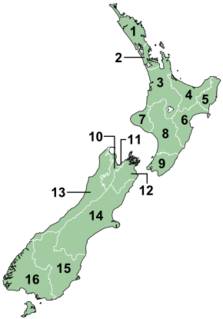
New Zealand is divided into sixteen regions for local government purposes. Eleven are administered by regional councils, and five are administered by unitary authorities, which are territorial authorities that also perform the functions of regional councils. The Chatham Islands Council is similar to a unitary authority, authorised under its own legislation.

Protected areas of New Zealand receive protection to preserve their environmental, historical or cultural value. The method and aims of protection vary according to the importance of the resource and whether it has public or private status. Nearly 30 percent of the land mass of New Zealand is in public ownership and has some degree of protection; these areas include conservation parks, mainland islands, island reserves, marine reserves, and national parks.
A resource consent is the authorisation given to certain activities or uses of natural and physical resources required under the New Zealand Resource Management Act. Some activities may either be specifically authorised by the RMA or be permitted activities authorised by rules in plans. Any activities that are not permitted by the RMA, or by a rule in a plan, require a resource consent before they are carried out.
Integrated coastal zone management (ICZM) or Integrated coastal management (ICM) is a process for the management of the coast using an integrated approach, regarding all aspects of the coastal zone, including geographical and political boundaries, in an attempt to achieve sustainability
Kaitiaki is a New Zealand Māori term used for the concept of guardianship, for the sky, the sea, and the land. A kaitiaki is a guardian, and the process and practices of protecting and looking after the environment are referred to as kaitiakitanga.
The Fourth National Government of New Zealand was the government of New Zealand from 2 November 1990 to 27 November 1999. Following electoral reforms in the 1996 election, Jim Bolger formed a coalition with New Zealand First. Following Bolger's resignation, the government was led by Jenny Shipley, the country's first female Prime Minister, for the final two years.

The Environment Court of New Zealand is a specialist court for plans, resource consents and environmental issues. It mainly deals with issues arising under the Resource Management Act, meaning that it covers a wide range of potential future effects of planning applications, which can include such areas as traffic congestion, noise/pollution emissions and social and commercial consequences, rather than just the 'ecological' aspects that could be implied by the 'environmental' term.

Environmental Defence Society (EDS) is a not-for-profit environmental organisation based in New Zealand. It focuses on issues surrounding the Resource Management Act 1991 and is made up of resource management professionals who are committed to improving environmental outcomes within New Zealand.
Guy Winston Salmon is a New Zealand environmentalist.
A water conservation order is a legal ruling to protect aspects of water bodies. It may be to protect the quantity of the water itself or for any issues relating to the water body as a whole.

The Conservation Act 1987 is New Zealand's principal act concerning the conservation of indigenous biodiversity. The Act established the Department of Conservation and Fish and Game, and complements the National Parks Act 1980 and the Reserves Act 1977.

Canterbury Regional Council is the regional council for Canterbury, the largest region in the South Island of New Zealand. It is part of New Zealand's structure of local government. It uses the promotional name Environment Canterbury, frequently abbreviated to ECan.

Geothermal power in New Zealand is a small but significant part of the energy generation capacity of the country, providing approximately 17% of the country's electricity with installed capacity of over 900MW. New Zealand, like only a small number of other countries worldwide, has numerous geothermal sites that could be developed for exploitation, and also boasts some of the earliest large-scale use of geothermal energy in the world.
The first New Zealand Coastal Policy Statement (NZCPS) was released in 1994 and replaced in 2010. The NZCPS is a requirement under Section 56 of the Resource Management Act 1991.
Anthony Penrose Randerson was appointed New Zealand Chief High Court Judge on 16 December 2004. He was subsequently appointed to the Court of Appeal of New Zealand with effect from 1 February 2010, and retired as the longest serving judge of that court in May 2017.

Dr Jan Wright is New Zealand's third Parliamentary Commissioner for the Environment. She was sworn in as Parliamentary Commissioner for the Environment for a five-year term on 5 March 2007, and was reappointed for a further five years in 2012.
This is a list of notable events relating to the environment in 1991. They relate to environmental law, conservation, environmentalism and environmental issues.

Environmental Defence Society v New Zealand King Salmon was a case in the Supreme Court of New Zealand concerning the proper interpretation of the Resource Management Act 1991 by planning bodies.

North Shore City Council v Auckland Regional Council was a case in the Environment Court of New Zealand concerning the proper interpretation of section five of the Resource Management Act 1991 by planning bodies.






